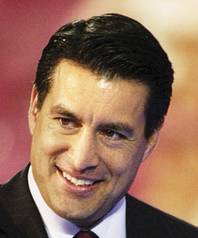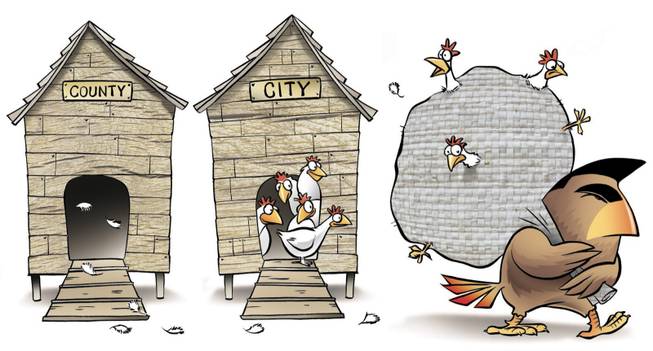Wednesday, Feb. 2, 2011 | 2:01 a.m.

Brian Sandoval

Heidi Gansert
Beyond the Sun
Sun Coverage
Sun archives
- Education in forefront of upcoming budget battle (1-30-2011)
- Chancellor: University tuition would have to go up 73 percent to cover Sandoval budget gap (1-27-2011)
- School officials warn of jobs cuts, larger classes under proposed budget (1-26-2011)
- A steep climb for Nevadans (1-26-2011)
- Soft words during State of the State hide Nevada in pain (1-25-2011)
- Teachers not pleased with most of Sandoval’s speech (1-25-2011)
- In response, Democrats say taxes might be part of budget solution (1-24-2011)
- Is Brian Sandoval’s ‘shared-sacrifice’ budget the solution to state’s economic woes? (1-23-11)
- Most vulnerable await budget cuts with trepidation (1-23-11)
- Increasingly worried liberals seek pushback on Sandoval budget (1-21-11)
- Construction industry: Raise taxes for job growth (1-20-11)
- Groups seek higher taxes on tobacco and gasoline (1-20-11)
- Sandoval warns of consolidation, job losses in state government (1-19-11)
Officials at the Clark County Government Center have for more than a week slogged through meetings and conference calls trying to make sense of Gov. Brian Sandoval’s budget.
It’s bad news. The governor has proposed siphoning $150 million from Clark County coffers and dropping in its lap responsibility for $100 million in services.
Two miles away, at Las Vegas City Hall, Oscar Goodman carries on with his happiest-mayor shtick, unfazed by the goings-on in Carson City. Nothing in Sandoval’s budget will significantly affect the city’s revenue or responsibilities.
For a governor who has promised shared sacrifice, there’s a noticeable divide in the way Sandoval’s budget deals with the local governments: Counties will shoulder a hefty burden to help close the deficit while every city in the state will be held harmless.
“It’s very unsettling to see how much the governor’s proposed budget would rely on the citizens of Clark County to solve the state’s deficit,” Commissioner Mary Beth Scow said.
The reason for the unequal treatment among local governments is unclear. The administration won’t address the question of fairness directly.
But some political observers cite pragmatism and others politics.
For example, county governments provide some services — social services, indigent care, criminal justice services — using state funding. Sandoval has proposed counties begin picking up the tab for these.
In that regard it makes sense for the state to shift those responsibilities to the counties because they have the know-how and staff to do the job.
“There are things that we have been funding that they should be funding,” Sandoval’s Chief of Staff Heidi Gansert said.
And Gansert noted that counties benefit financially from juvenile justice and mental health court programs, which help keep people out of county-funded jails and emergency rooms.
Similarly, the state sweeps some county property tax revenue into its coffers. Making that permanent, as Sandoval has proposed, would involve little change. Sandoval can argue that counties have managed to get by without it, and cities also contribute to that pot.
Still, some are baffled that Sandoval is not looking to cities for other revenue streams, which could be taken from rainy day accounts or sales tax revenue.
For residents of unincorporated Clark County, the governor’s budget presents a double hit. Clark County provides both county and municipal services for those citizens, services such as maintaining parks and issuing business licenses. For city residents, those services will be untouched by the state.
When asked about the disparity, Gansert said: “We weren’t looking beyond appropriating more than was already being reappropriated, and that was property tax.”
In other words, cities weren’t losing money to the state, so why start now?
Singling out counties has its political advantages for the Sandoval administration.
Sandoval is taking on two big entities — Clark and Washoe counties — rather than 20-odd towns and cities scattered throughout the state. It’s fewer phone calls to field and complaints to tackle and fewer lobbyists working against him.
Clark County is an especially easy target for a governor based in Northern Nevada.
He enters office as public employee salaries have become a flash point in the debate over government spending. If the county cries poverty, the governor need only point to the high salaries and alleged sick pay abuses of Clark County firefighters to underscore why he thinks there’s fat in local government budgets.
“It’s pretty clear that for many, many years, particularly in certain pockets of the state, Clark County has been viewed as the pot of gold,” said Guy Hobbs, an economist who was Clark County’s fiscal director in the early 1980s. “But it’s the government in the state with the most diverse set of expenditure responsibilities. This is where the growth has taken place and where the services are in most demand.”
Sandoval’s budget isn’t the first to go after counties while leaving cities unscathed. The 2009 Legislature hit only counties.
Since 2008, when it began to face large budget deficits, the state has taken
$283 million from local governments, primarily Clark and Washoe counties, according to the Nevada Association of Counties. Clark County officials estimate the Legislature’s moves have cost it about $180 million over two years.
Lawmakers never explained why they only picked on counties.
Then-Assembly Speaker Barbara Buckley was seriously considering a run for governor against Clark County Commissioner Rory Reid in the Democratic primary. Some speculated that the money the state took from Clark County would push tough decisions onto local government, forcing Reid to make choices about what to cut. Buckley and her allies strongly denied it.
(Some apply the same logic to Sandoval’s budget — he wants to maintain his popularity and outsource some of the tough decisions to local governments.)
Others cited the Gibbons administration’s ties to the law firm McDonald Carano, which represents the Nevada League of Cities.
But the truth, according to sources involved in the 2009 budget decisions, may be this: It was simply easier administratively for the governor and Legislature to take money from two counties than a host of cities.
Sandoval met last month with the mayors of Nevada’s five largest cities. The mayors left with smiles on their faces and reported that the governor pledged not to take their reserves or touch their revenue.
County officials also met with Sandoval, according to Nevada Association of Counties Director Jeff Fontaine, but with a different outcome.
“I know there’s this perception out there that local governments have a lot of money, but that’s not the reality,” Fontaine said. “Counties already are carrying out state-mandated services. Now to take on more state services, that’s going to impact constituents.”
Commissioner Steve Sisolak said: “I fully understand there are going to be cuts. But the wider you can spread them, the better it will be for everyone. If everyone was handled the same way, it wouldn’t be as painful for a particular city, county or group of constituents.”
Reporter David McGrath Schwartz contributed to this story.


Join the Discussion:
Check this out for a full explanation of our conversion to the LiveFyre commenting system and instructions on how to sign up for an account.
Full comments policy